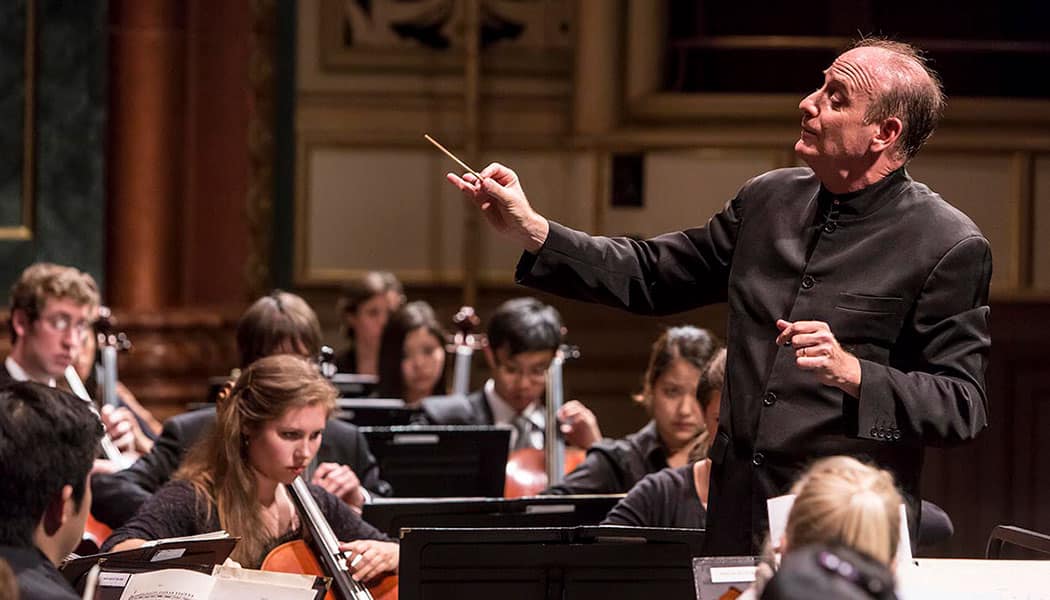When Larry Rachleff steps onto the podium on Sunday, July 11, it will be to conduct an orchestra program bearing the title of “Welcome Concert.” This moniker is meant to convey a sense of, well, welcome to the community – a welcome to the 2021 Summer Festival and also a welcome back after more than a year of mostly silent halls.
But this title – this welcome – could just easily be directed at another group: the fellows on stage who make up the orchestra. That’s because Larry has been tasked – just as he has been every summer for more than a decade – with forming the orchestra, with taking a group of phenomenally talented individual musicians and molding them into an ensemble.
“I think I’ve always loved the challenge of trying to make young people sound old, and old people sound young,” Larry says of his role. “It is my job to try and impart a sense of security and poise in their musicianship.”
In 2021, there are additional layers to what is an already complicated endeavor. “This time it will be even more unique, because except for a few schools, most of these folks have not played in any orchestral ensemble in a year and a half. Also, this will be unique because there are safety protocols that require musicians to be spaced differently.”
If history is any indication, then Larry is up to this challenge, as for the last twelve years, he has always managed his role superbly. And he is quick to share the credit for this success. “I can only take a marginal amount of credit, because there are so many components that all conspire to make this work. When you get musicians of this level, a gifted faculty of this type, and administration that is richly behind you, you then try to instill in the musicians the confidence that they are going to be great.”
Larry Rachleff is clearly a humble man. During our interview, for example, he described himself as a “warm-up act.” Humility is, of course, a virtue, but perhaps he is being a bit too humble. A more apt metaphor might be that of the starting pitcher in baseball. It is his role to set the tone for every orchestral rehearsal and performance that follows.
“I often say is that our goal is to learn techniques and strategies, so that every subsequent conductor doesn’t need to repeat certain concepts that are embedded in the art of orchestral playing,” says Larry. “There’s no doubt that if the final concert is a huge home run, the first concert had something to do with it.”
To this end, every aspect of the concert programming is planned with the fellows’ musical education in mind. “We try to pick a repertoire in the beginning that will help establish orchestral routine – listening, breathing, eye contact with one another. And we always do it with great music, because wonderful music inspires all.”
The opening piece – a brass fanfare called Punch by Australian composer Katy Abbott – was selected to help build a sense of ensemble within the brass and timpani. It’ll also be a fun piece for the audience. “It’s very ceremonial and accessible to the public, which I thought was important. It will welcome the return of live music with something brief, exciting, interesting, and for the players has certain important ensemble criteria.”
Even though elements of the opening concert’s program have evolved during months of planning, Wolfgang Mozart’s Symphony No. 39 in E-flat Major was always in the works. “It’s a great piece of music, of course. But it’s also a great orchestral training piece, if you will, and a great orchestral building piece.”
What it doesn’t have, however, is oboe parts. (Mozart was obsessed at the time with a new instrument, the clarinet, a pair of which he used in Symphony No. 39 in lieu of oboes.) So, one requirement for the final piece was that it simply must have a good oboe part. Several possible works were considered before COVID-19 vaccines were widely available and California announced its full reopening. When the pandemic landscape improved, though, it became possible to consider programming works written for a somewhat larger ensemble, and Larry thought it would be great to try and involve all the instrumental studios in some way – all while still observing increased social distancing on stage at the Granada Theatre.
“I so wanted to find a piece that could involve fellows from every studio. The result was Igor Stravinsky’s 1919 version of Firebird Suite, which has harp, piano, a battery of percussion and timpani, active trumpets, and low brass. And, of course, famous winds and strings. And a very prominent first oboe part.”
And thus, a Welcome Concert – one for welcome both the community and the musicians – was born.
***
That Larry Rachleff’s role is one that could be taken for granted is a testament to the abilities of the fellows and the teaching of the faculty. It is not, however, a role that should be taken for granted. He is not just a conductor and certainly not a warm-up act. He’s a devoted educator and tireless advocate for young musicians who has been imparting his wisdom to Academy fellows for well over a decade.
During our interview for this piece, I asked Larry why amidst his years of conducting professional orchestras he continues to return to the art of teaching young musicians. His answer speaks volumes about the kind of conductor, educator, and person he is:
“I would say I’m really lucky that I have 2 major salvations in my life. I have my family, and I have working with young people. To be a small part of the trajectory of someone’s life, whether they become a professional orchestral musicians or not, is such a privilege.”
– Henry Michaels
Project Resonance Blog editor, Director of Audience Experience and Engagement, Music Academy of the West


